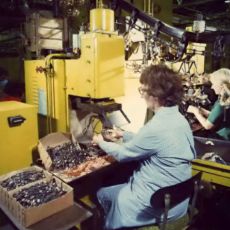Sat, 02/01/16
Socially Useful Production
Worker-controlled companies often apply the principle "production for use, not for profit", using their existing skills and machinery to switch production towards the fulfilling of human needs and away from environmentally and socially hazardous products.
Topic:
Get involved!
Help us expand the Workers Control Archive!
If you think you have some interesting text or content is missing:
Get in contact ›››
Recommended articles
|
Dismantling the myth that the council communist tradition actually advocated a self-managed capitalist economy, rather than a truly communist one.
|
|
Workers’ self-management is associated with times of social transformation. The state may chose to either restrict self-management or facilitate it so the conflict is institutionalised and contained.
|
|
Thirty-eight years ago, a movement for ‘socially useful production’ pioneered practical approaches for more democratic technology development.
|
|
Workers' management is not just a new administrative technique: it means that for the mass of people, new relations will have to develop with their work, the very content of work will have to alter.
|
|
Robert Vitak
|






Comments
Post new comment